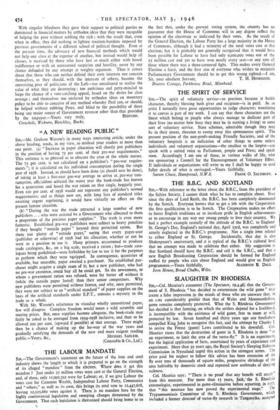THE LABOUR MANDATE
Sig,—The Government's statement on the future of the iron and steel industry shows the length to which it is prepared to go on the strength of its alleged " mandate " from the electors. Where does it get this mandate ? Just under 25 million votes were cast at the General Election, and, of these, only 11,992,292 were for Labour.' or, if we give Labour the votes cast for Common Wealth, Independent Labour Party, Communist and " others," as well as its own, this brings its total vote to 12,447,618, leaving 12,525,680 votes against it. There is no mandate here for the highly controversial legislation and sweeping changes threatened by the Government. That such legislation is threatened should bring home to us
the fact that, under the .present voting system, the country has no guarantee that the House of Commons will in any degree reflect the opinion of the electorate as indicated by their votes. As the result of the General Election, the Labour Party has a large majority in the House of Commons, although it had a minority of the total votes cast at that election; but it is probably not generally recognised that it would have been possible for Labour to have had only 9,900,000 votes out of the 25 million cast and yet to have won nearly every seat—at any rate all those where there was a three-cornered fight. This makes every General Election a farce, and the first aim of everyone who wishes to maintain Parliamentary Government should be to get this wrong righted.—I am, Sir, your obedient Servant, T. H. HOSEGOOD. Bratton Cottage, Parkhouse Road, Minehead.






























 Previous page
Previous page